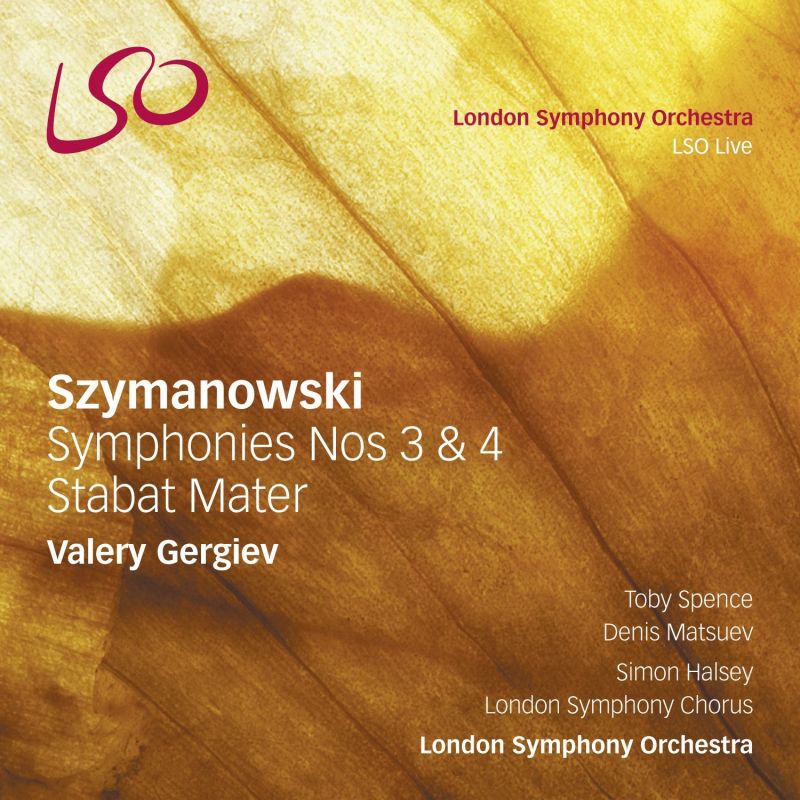SZYMANOWSKI Symphonies Nos 3 & 4
Live Szymanowski from Gergiev’s 2013-14 concerts
View record and artist detailsRecord and Artist Details
Composer or Director: Karol Szymanowski
Genre:
Orchestral
Label: LSO Live
Magazine Review Date: 11/2013
Media Format: Super Audio CD
Media Runtime: 69
Mastering:
DDD
Catalogue Number: LSO0739

Tracks:
| Composition | Artist Credit |
|---|---|
| Symphony No. 3, '(The) song of the night' |
Karol Szymanowski, Composer
Karol Szymanowski, Composer London Symphony Orchestra Toby Spence, Tenor Valery Gergiev, Conductor |
| Stabat Mater |
Karol Szymanowski, Composer
Ekaterina Gubanova, Mezzo soprano Karol Szymanowski, Composer Kostas Smoriginas, Bass-baritone London Symphony Chorus London Symphony Orchestra Sally Matthews, Soprano Toby Spence, Tenor Valery Gergiev, Conductor |
| Symphony No. 4, 'Symphonie Concertante' |
Karol Szymanowski, Composer
Denis Matsuev, Piano Karol Szymanowski, Composer London Symphony Orchestra Valery Gergiev, Conductor |
Author: Edward Seckerson
The Stabat mater arrives like purification – simple and direct, and cut from the same cloth (though less brazenly Slavic) as Janáček’s Glagolitic Mass. The nature of the text makes for something humbler and more intimate. The opening of the third movement – a duet for contralto and solo clarinet – sums up its ethos, plaintive and archaic with the merest hint of a 20th-century veneer, but the heart of the matter is accessed through the fourth movement, for a cappella chorus and female soloists, where Mary’s lamentation finds expression in beautiful chord progressions. With the sixth movement – where Szymanowski’s soprano rolls out what he described as ‘the most beautiful melody I ever managed to write’ – it still comes as something of a shock to hear how Górecki was so much more than just influenced by that tune in his far better known, indeed now iconic, Third Symphony.
Szymanowski’s Fourth Symphony – written 16 years after the Third when the thicker, heavier, air had well and truly cleared from his compositional technique – sounds more of a concerto than symphonie concertante in this performance, featuring the Russian powerhouse pianist Denis Matsuev, than it did recently with the more discreet Louis Lortie with Edward Gardner on Chandos. Matsuev has his feet more firmly planted on terra firma, the edgier writing displaying more of a kinship with Bartók until the gorgeous return to lushness in the second movement suggests an almost Ravelian sensibility. Certainly Matsuev and Gergiev go all out to turn the finale into Szymanowski’s danse générale.
Discover the world's largest classical music catalogue with Presto Music.

Gramophone Digital Club
- Digital Edition
- Digital Archive
- Reviews Database
- Full website access
From £8.75 / month
Subscribe
Gramophone Full Club
- Print Edition
- Digital Edition
- Digital Archive
- Reviews Database
- Full website access
From £11.00 / month
Subscribe
If you are a library, university or other organisation that would be interested in an institutional subscription to Gramophone please click here for further information.




